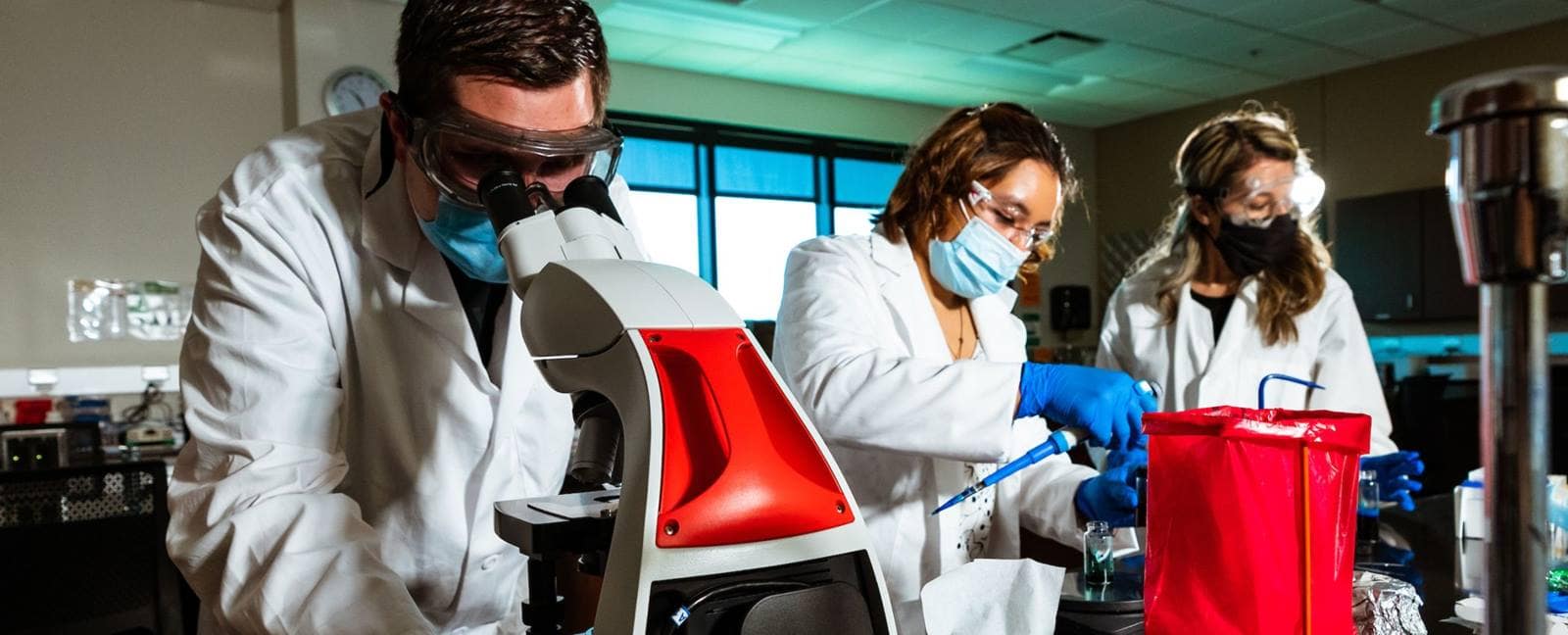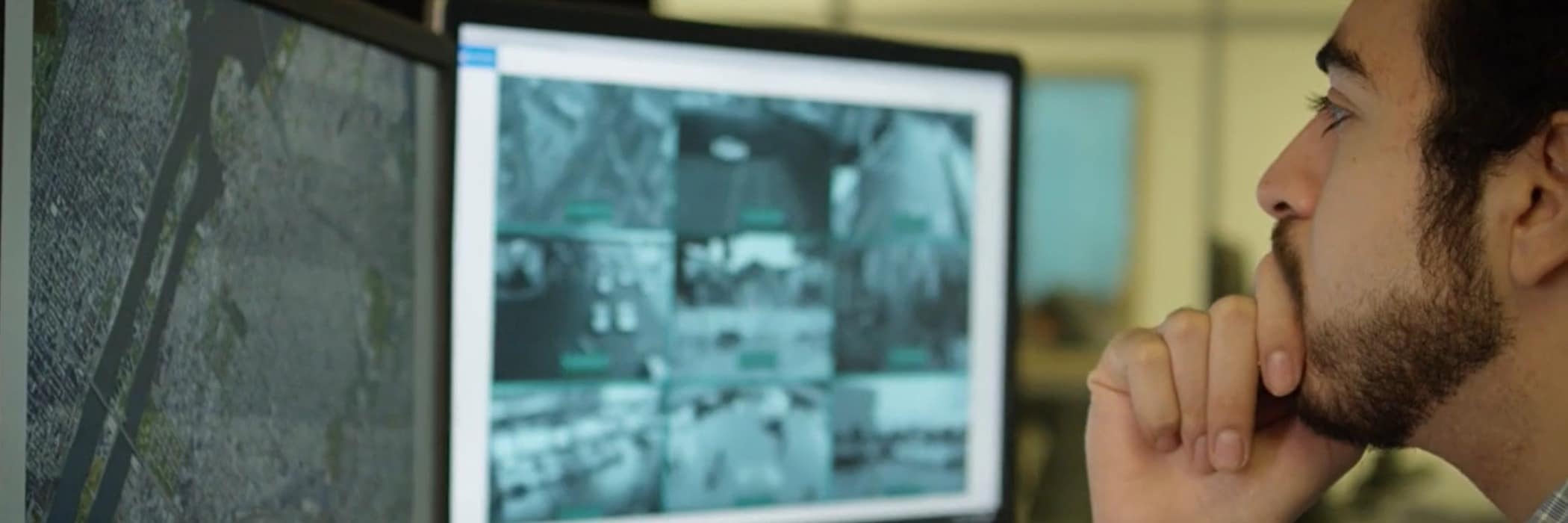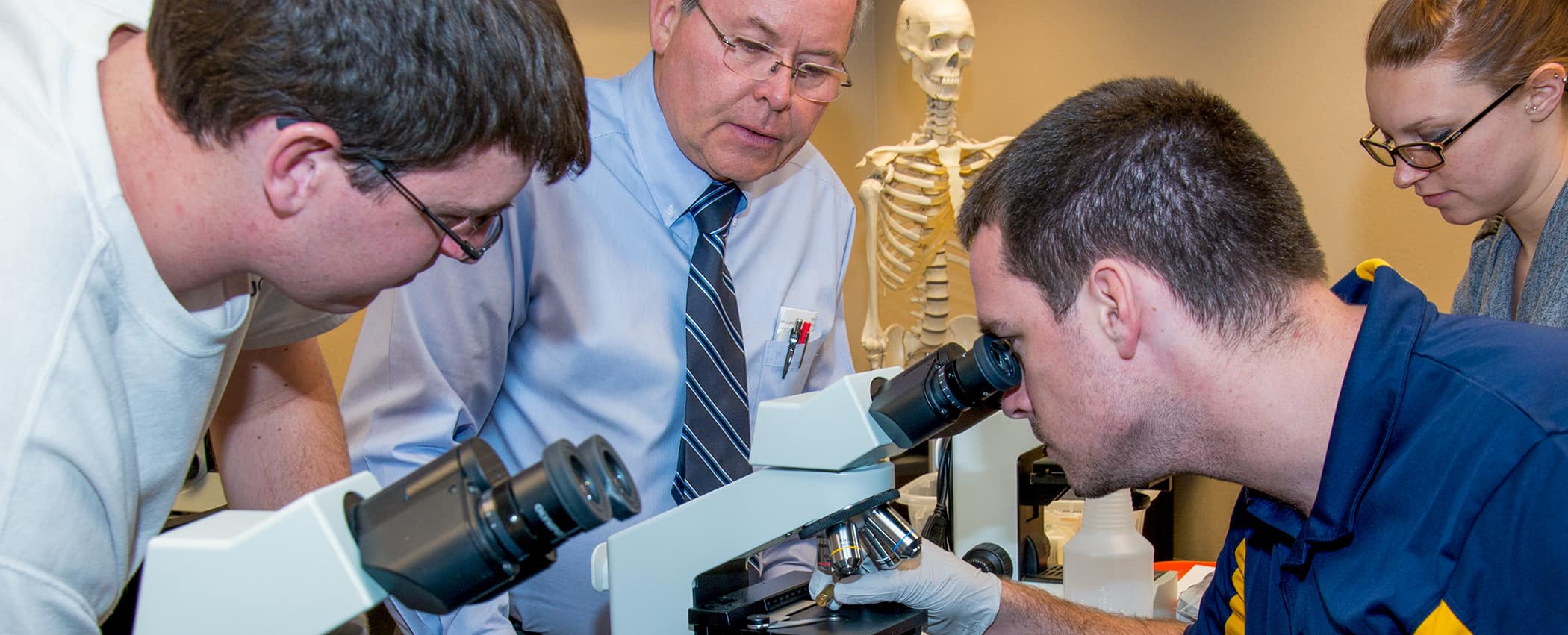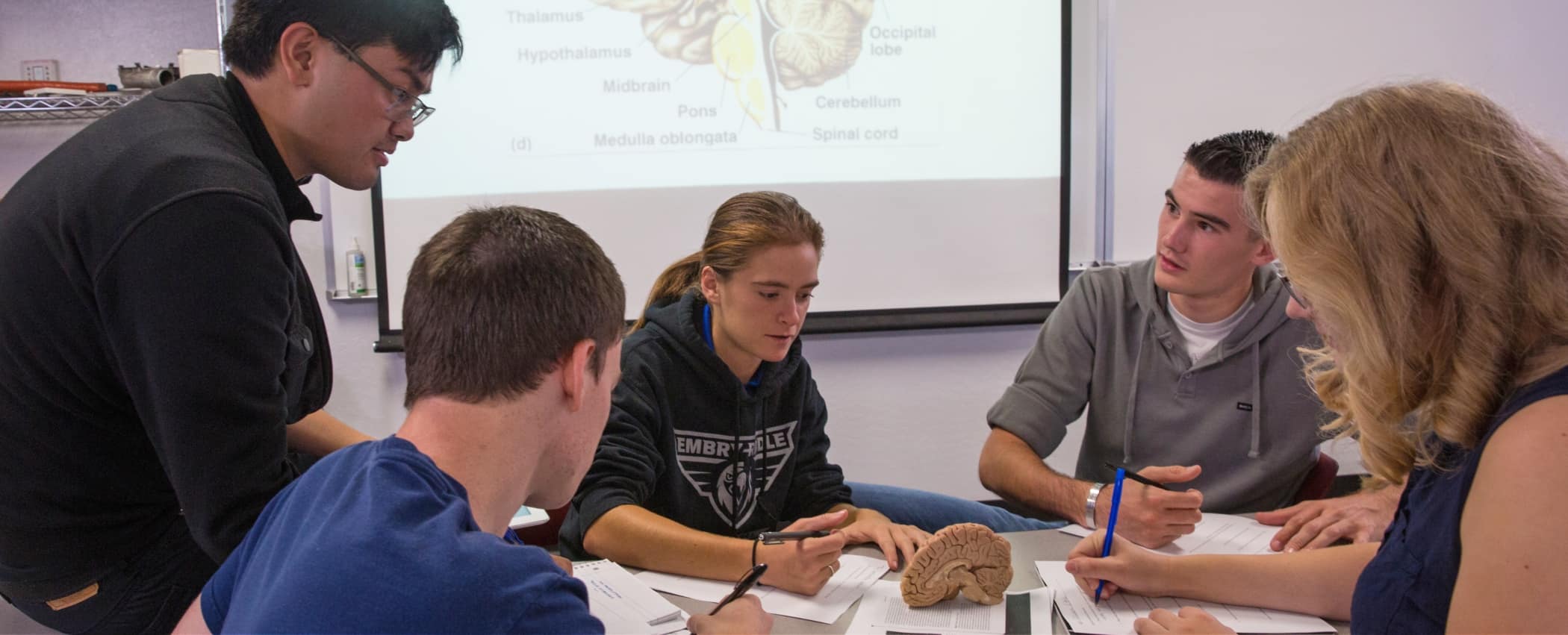
Bachelor of Science in
Applied Biology
Students learn the foundations of biological science in this program, preparing them to pursue a diverse range of career paths in aviation, aerospace and beyond.
The B.S. in Applied Biology will provide students with foundational knowledge across the biological sciences, while also allowing them freedom to design their upper-level coursework to suit their particular interests in a diversity of career paths, from the human health sciences and pre-med to careers in natural resources management and those that align with our niche in aerospace and aviation.
The dynamic nature of this program, with 20 hours of open electives, also encourages students to explore possible concentrations such as health science, ecology, wildlife science, or forensic biology along with a minor in unmanned aerial systems, psychology, accounting, cyber intelligence and security, finance or any other minor offered by the university that has 18 credit hours that do not overlap with the degree requirements of their major.
Students can choose either a biology or chemistry capstone project, which they can tailor to their focal point. If they choose, they can use this project to do research with faculty as well as develop their own research. Some options for research with faculty include: drug design and discovery, computational autodocking studies, DNA research, wildlife and airport risk research.
Graduates of this degree program will have the background and technical skills necessary to apply for admission to graduate/medical school, professional health sciences programs, or entry-level jobs across many biological sub-disciplines, such as the human health sciences, genetics, microbiology or ecology.
Graduates from ERAU have worked at NASA and some have been astronauts. There is excellent potential for future graduates of Applied Biology to also pursue a career at NASA. Other institutions graduates can expect to be hired by include laboratories, pharmacies, educational institutions, government offices, airports, zoos, national parks or forest services, private companies and more.
DETAILS
About Applied Biology at the Prescott, AZ Campus
The Bachelor of Science in Applied Biology, housed within the Department of Biology and Chemistry in the College of Arts and Sciences, provides students with an expert education in the multi-faceted field of biology. Students preparing for futures in human health, genetics, microbiology, or ecology will have a foundational knowledge in biological science, and will also have the opportunity to explore their particular interests in upper-level coursework designed by you and guided by our experienced faculty.
Arizona is an ideal natural laboratory, as it is the third most biodiverse state, with ecosystems ranging from Sonoran Desert lowlands outside of Phoenix to high mountain alpine forests outside of Flagstaff. In Prescott, we are in close proximity to many iconic natural areas, including the Grand Canyon, Saguaro National Park and Sedona’s red rock country.
Our state of the art laboratories set our biology degree program apart from those at other universities. Our labs are equipped with professional grade scientific technology that is integrated into nearly every course. The instrumental analysis lab which is equipped with Bench-top NMR (80 MHz), FT-IR, UV-VIS, and GC-MS, and ensures that our students will be trained to use this equipment and will graduate with not only theoretical knowledge and critical thinking skills but also with the ability to practice science in the lab, field, or examination room.
Classroom size is kept small, which provides more opportunities for interaction and mentoring by our expert faculty. For those that wish to go to medical school or secure a job in the health science post-graduation, there are many medical centers where they could possibly do their capstone project, including the regional hospital in Prescott, Yavapai Regional Medical Center (YRMC).
Students are encouraged to participate in any of our campus' nearly 200 clubs and organizations, such as the Eagle Chemistry Club, which are student-led and give occasion for students to develop leadership skills.
Student Learning Outcomes
Students will:
- Demonstrate topic mastery of core concepts in biological sciences.
- Analyze the historical context of biological discoveries and their role in modern society.
- Apply modern biological techniques to critically evaluate and synthesize information in biological sciences.
- Demonstrate in-depth knowledge in a specific area of expertise.
- Refine career-related or post-graduate goals through internships or capstone experiences.
- Apply mathematics, physics, chemistry, and basic biological sciences at a foundational level.
Degree Requirements
Students in the Applied Biology (AB) program must complete 120 credit hours, including a solid foundation in mathematics, physics, chemistry, and fundamental biological sciences. The program offers two distinct tracks: the Environmental Science Track, which focuses on ecological systems, environmental impact, and geographic information systems, and the Health Science Track, designed for careers in health-related fields. This structure allows students to gain specialized knowledge and practical skills aligned with their career goals. A unique feature of the program is its emphasis on hands-on experience, with professional-grade scientific equipment available in nearly every course’s laboratory component. This approach ensures that graduates receive both theoretical knowledge and practical expertise, equipping them with critical thinking skills and proficiency in laboratory and scientific settings. Additionally, students are required to complete a capstone project, internship, or research project, providing valuable real-world experience. To progress through the program, students must achieve a minimum grade of C in core biology and chemistry courses.
Program Requirements
General Education
Embry-Riddle degree programs require students to complete a minimum of 36 hours of General Education coursework. For a full description of Embry-Riddle General Education guidelines, please see the General Education section of this catalog.
Students may choose other classes outside of their requirements, but doing so can result in the student having to complete more than the degree's 120 credit hours. This will result in additional time and cost to the student.
| Communication Theory and Skills | 9 | |
| Computer Science/Information Technology | 3 | |
| Mathematics | 6 | |
| Physical and Life Sciences (Natural Sciences) | 6 | |
| Humanities and Social Sciences | 12 | |
3 hours of Lower-Level Humanities | ||
3 hours of Lower-Level Social Science | ||
3 hours of Lower-Level or Upper-Level Humanities or Social Science | ||
3 hours of Upper-Level Humanities or Social Science | ||
| Total Credits | 36 | |
Applied Biology Core (78 credits)
The following course of study outlines the quickest and most cost-efficient route for students to earn their B.S. in Applied Biology. Students are encouraged to follow the course of study to ensure they complete all program-required courses and their prerequisites within four years.
Courses in the core with a # will satisfy your general education requirements.
| BIO 120 & 120L | Foundations of Biology I and Foundations of Biology I Laboratory | 4 |
| BIO 121 & 121L | Foundations of Biology II and Foundations of Biology II Lab | 4 |
| BIO 215 & 215L | Genetics and Genetics Laboratory | 4 |
| BIO 142 | Intro to Environmental Science | 3 |
| BIO 216 & 216L | Microbiology and Microbiology Laboratory | 4 |
| BIO 304 | Critical Reading and Scientific Communication > | 1 |
| or CHM 304 | Critical Reading and Scientific Communication | |
| BIO 304 | Critical Reading and Scientific Communication > | 1 |
| or CHM 304 | Critical Reading and Scientific Communication | |
| BIO 304 | Critical Reading and Scientific Communication > | 1 |
| or CHM 304 | Critical Reading and Scientific Communication | |
| BIO 308 & 308L | Principles of Ecology and Principles of Ecology Lab | 4 |
| CHM 110 & 110L | General Chemistry I and General Chemistry I Laboratory | 4 |
| CHM 111 & 111L | General Chemistry II and General Chemistry II Laboratory | 4 |
| CHM 210 & 210L | Organic Chemistry I and Organic Chemistry I Laboratory | 4 |
| UNIV 101 | College Success | 1 |
| COM 122 | English Composition # | 3 |
| General Education - Communications Elective # | 6 | |
| General Education - Computer Science/Information Technology Elective # | 3 | |
| General Education - Humanities Lower-Level Elective # | 3 | |
| General Education - Social Science Lower-Level Elective # | 3 | |
| PSY 101 | Introduction to Psychology # | 3 |
| or SS 210 | Introduction to Sociology | |
| MA 222 | Business Statistics # | 3 |
| MA 241 | Calculus and Analytical Geometry I # | 4 |
| PS 113 & 113L | Introductory Physics I and Introductory Physics I Laboratory # | 4 |
| PS 117 & 117L | Introductory Physics II and Introductory Physics II Lab # | 4 |
| HU 330 | Values and Ethics # | 3 |
| Total Credits | 78 | |
Health Sciences Track (27 credits)
Choose a total of 27 credits from the list of courses below. 40 credits (including core) must be 300 level or above:
| BIO 302 & 302L | Instrumental Analysis and Trace Evidence and Instrumental Analysis and Trace Evidence Lab | 4 |
| BIO 305 & 305L | Human Anatomy and Physiology I and Human Anatomy and Physiology Laboratory | 4 |
| BIO 306 & 306L | Human Anatomy and Physiology II and Human Anatomy and Physiology II Laboratory | 4 |
| BIO 405 & 405L | Molecular and Cell Biology and Molecular and Cell Biology Laboratory | 4 |
| BIO 444 | Immunology | 3 |
| BIO 450 | Exercise Physiology and Human Performance | 3 |
| CHM 211 & 211L | Organic Chemistry II and Organic Chemistry II Laboratory | 4 |
| CHM 310 & 310L | Biochemistry and Biochemistry Laboratory | 4 |
| CHM 320 & 320L | Quantitative Analytical Chemistry and Quantitative Analytical Chemistry Laboratory | 4 |
| CHM 340 & 340L | Toxicology and Toxicology Laboratory | 4 |
| PSY 310 | Sensation and Perception | 3 |
| PSY 315 | Cognitive Psychology | 3 |
| PSY 335 | Physiological Psychology | 3 |
| PSY 354 | Developmental Psychology | 3 |
| PSY 365 | Abnormal Psychology | 3 |
Environmental Sciences Track (27)
Choose a total of 27 credits from the list of courses below. 40 credits (including core) must be 300 level or above:
| AS 220 | Uncrewed Aircraft Systems | 3 |
| AS 235 | Uncrewed Aircraft Systems Operation and Cross-Country Data Entry | 3 |
| AS 324 | Global Uncrewed Aircraft Systems (UAS) Regulations | 3 |
| AS 403 | Uncrewed Sensing Systems | 3 |
| BIO 245 & 245L | Natural History of the Region and Natural History of the Region Laboratory | 4 |
| BIO 302 & 302L | Instrumental Analysis and Trace Evidence and Instrumental Analysis and Trace Evidence Lab | 4 |
| BIO 330 | Environmental Consulting | 3 |
| BIO 403 | Wildlife and Airports | 3 |
| CHM 211 & 211L | Organic Chemistry II and Organic Chemistry II Laboratory | 4 |
| CHM 310 & 310L | Biochemistry and Biochemistry Laboratory | 4 |
| CHM 320 & 320L | Quantitative Analytical Chemistry and Quantitative Analytical Chemistry Laboratory | 4 |
| CHM 340 & 340L | Toxicology and Toxicology Laboratory | 4 |
| CS 118 | Fundamentals of Computer Programming | 3 |
| CS 125 | Computer Science I | 4 |
| CS 304 | Introduction to Computer Forensics | 3 |
| CS 305 | Database Systems and Data Mining | 3 |
| DS 150 | Data Science I: Introduction | 3 |
| DS 151 | Data Science II: Foundations | 3 |
| DS 244 | Data Acquisition and Manipulation | 3 |
| DS 312 | Machine Learning | 3 |
| DS 317 | Statistical Software | 3 |
| GEO 210 | Introduction to Geographic Information Systems * | 3 |
| GEO 310 | Advanced Geographic Information Systems * | 3 |
| GEO 350 | Introduction to Remote Sensing with GIS * | 3 |
| GEO 450 | Lidar Processing with GIS * | 3 |
| WX 201 | Survey of Meteorology | 3 |
| WX 203L | Survey of Meteorology Laboratory | 1 |
| WX 261 | Applied Climatology | 3 |
| WX 270 | Weather Information Systems | 3 |
| WX 353 | Thermodynamics of the Atmosphere | 3 |
| WX 354 | Dynamics of the Atmosphere | 3 |
| WX 458 | All Hazards Support, Modeling and Mapping. | 3 |
Co-op/Internship/Capstone/Research (3 credits)
Students must complete three (3) credits through a combination of the following options. At least three (3) credits must come from a research, internship, or capstone experience (BIO 310, CEAB 396, or BIO 490).
| CEAB 396 | Coop Applied Biology | 3 |
| BIO 310 | Research (Can be repeated up to six times) | 1 |
| BIO 490 | Senior Seminar | 3 |
Open Electives (12 Credits)
| Open Electives | 12 | |
| Total Credits | 120 | |
- #
General Education Courses
- *
GIS and Remote Sensing Certificate
- >
Course can be taken up to 3 times
All Army ROTC students are required to complete SS 321 - U.S. Military History 1900-Present (3 credits) in order to commission.
Suggested Plan of Study
| Freshman Year | ||
|---|---|---|
| Fall | Credits | |
| BIO 120 & 120L |
Foundations of Biology I | 4 |
| CHM 110 & 110L |
General Chemistry I | 4 |
| COM 122 | English Composition | 3 |
| MA 241 | Calculus and Analytical Geometry I | 4 |
| UNIV 101 | College Success | 1 |
| Credits Subtotal | 16.0 | |
| Spring | ||
| BIO 121 & 121L |
Foundations of Biology II | 4 |
| BIO 142 | Intro to Environmental Science | 3 |
| CHM 111 & 111L |
General Chemistry II | 4 |
| Humanities Lower-Level Elective | 3 | |
| Credits Subtotal | 14.0 | |
| Sophomore Year | ||
| Fall | ||
| BIO 215 & 215L |
Genetics | 4 |
| CHM 210 & 210L |
Organic Chemistry I | 4 |
| Communication Elective | 3 | |
| Designated Elective | 3 | |
| Credits Subtotal | 14.0 | |
| Spring | ||
| BIO 304 | Critical Reading and Scientific Communication | 1 |
or CHM 304
|
Critical Reading and Scientific Communication | |
| BIO 216 & 216L |
Microbiology | 4 |
| Designated Electives | 4 | |
| MA 222 | Business Statistics | 3 |
| PSY 101 | Introduction to Psychology | 3 |
| Credits Subtotal | 15.0 | |
| Junior Year | ||
| Fall | ||
| BIO 308 & 308L |
Principles of Ecology | 4 |
| Computer Science/Information Technology Elective | 3 | |
| Open Electives (Upper-Level) | 3 | |
| PS 113 & 113L |
Introductory Physics I | 4 |
| Credits Subtotal | 14.0 | |
| Spring | ||
| Designated Electives | 8 | |
| BIO 304 | Critical Reading and Scientific Communication | 1 |
or CHM 304
|
Critical Reading and Scientific Communication | |
| PS 117 & 117L |
Introductory Physics II | 4 |
| Social Science Elective | 3 | |
| Credits Subtotal | 16.0 | |
| Senior Year | ||
| Fall | ||
| CEAB 396 Internship or Capstone * | 3 | |
| Communication Elective | 3 | |
| Designated Electives | 8 | |
| Open Electives (Upper Level) | 3 | |
| Credits Subtotal | 17.0 | |
| Spring | ||
| BIO 304 | Critical Reading and Scientific Communication | 1 |
or CHM 304
|
Critical Reading and Scientific Communication | |
| Designated Electives | 4 | |
| Open Elective (Upper Level) | 6 | |
| HU 330 | Values and Ethics | 3 |
| Credits Subtotal | 14.0 | |
| Credits Total: | 120.0 | |
- *
Students must complete three (3) credits through a combination of the following options. At least three (3) credits must come from a research, internship, or capstone experience:
CEAB 396 Internship/Co-Op
BIO 490 Senior Seminar
BIO 310 Research (Can be repeated up to six times)
Get Started Now:
Summary
120 Credits
Estimate your tuition by using the Tuition Calculator
View Financial Aid Information
Learn about our General Education
Find out about transferring credits to this degree
Learn more about our Veterans & Military benefits
View our Academic Calendar












